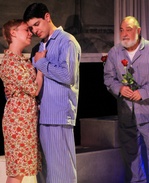SITE GUIDE
SEARCH
REVIEWS
REVIEW ARCHIVES
ADVERTISING AT CURTAINUP
FEATURES
NEWS
Etcetera and
Short Term Listings
LISTINGS
Broadway
Off-Broadway
NYC Restaurants
BOOKS and CDs
OTHER PLACES
Berkshires
London
California
New Jersey
DC
Connecticut
Philadelphia
Elsewhere
QUOTES
TKTS
PLAYWRIGHTS' ALBUMS
LETTERS TO EDITOR
FILM
LINKS
MISCELLANEOUS
Free Updates
Masthead
A CurtainUpPhiladelphia Review
Saturn Returns
|
The most difficult thing in life is the intimate relationship between two people. The second is staging a musical.—Gustin
|

Amanda Schoonover, David Raphaely, Harry Philibosian in Theatre Exile' s Saturn Returns.
(Photo: Paola Nogueras) |
Legend has it that the pre-Roman god Saturn was a fun-loving guy (note Saturnalia). But his ringed planet namesake is a gruff, high-ranking motivator who takes almost 30 years to orbit the sun. Some believe that life-altering crises occur when surly Saturn returns to the position he occupied at the moment of one's birth. These junctions where things begin, end, or both are called Saturn Returns. Although Noah Haidle's title is not mentioned in the play itself, the concept is explained in Theatre Exile's program as an aid to audience understanding.
The tribulations of a Saturn Return can provide the impetus to recoup and reinvent one's life, but they also can immobilize — blocking forward movement. This story centers around the latter situation. Guston is a tragic figure who fully realizes his own inability to move on after the death of his wife when he was 28, and the death of his daughter when he was 58. Now he is 88 and Saturn returns.
Guston (Harry Philibosian) has been engaged in "unforgetting," spending the last 60 years looking back. A non-Phoenix, who cannot rise from the ashes of his past, Guston has learned neither how to be solitary nor how to connect. So no possibilities have opened up for him. This story begins when he gets a new home-health aide, Suzanne (Amanda Schoonover).
As the play progresses, it becomes clear that playwright Noah Haidle has set himself a dimensional puzzle. Structurally it's a 3D tic-tac-toe in which the 3-layer convergences are time-dependent. The story transpires in these intersections of time and recollection. To make the game even more interesting, one woman plays three women, and three men play one man.
The three manifestations of the man are sometimes on stage at the same time, and fluidity is key. The spectral Gustons are portrayed by David Raphaely (young) and Joe Canuso (middle aged). Together with Philobosian's old man, they portray a consistent character, stopped dead in his developmental tracks by tragedy.
Sidebar: Is Guston's name a sly wink at 'gusto', the life-enjoyment that the character so massively lacks? Another odd note — Guston lives a strangely olfactory existence, describing life by the smells he experiences (although at one point he shifts to another sense, observing, "She tasted like Thursday"). One last side note — I recall Harry Philibosian, a local treasure, as the warm grandfather in Goldberg's God of Desire, and as the father in Hollinger's Senior Moment. His Shelly Levine was spot on in Glengarry Glenn Ross.
Back to the play at hand: Guston continues to experience echoes of the two key times in his past. He watches them unfold helplessly with no energies, no new insights, no forgetting, and no healing until a first crack opens when he is 88. He forgets his own neediness and self-absorption for a moment in order to tend to someone else's pain. After years with no movement this breakthrough offers a slight possibility for a move away from utter sadness. Until this moment, Guston has seen himself only through the lens of privation. This new development may be a ray of possible hope or it may become another facet of a delusion.
With this show Brenna Geffers, Associate Director of Theatre Exile, directs her first Exile production, and overall she turns in a good job, although there are a few issues to discuss both with the play and the production:
This show, though powerful and sweet, is not completely polished. Scenes of the past can be cut some slack — it's ok if they are glossed over or airy-fairy. However, scenes grounded in the present should be nailed down. One example: tiny adjustments would be in order for a pivotal moment where Guston takes an action that requires detail and specificity to be credible.
A larger problem is that the play's start seems rote. Guston's important-sounding recitations don't come off well, like his jokes. Smartass attitude is far more effective than uncomfortably formal moments of self-conscious poetic rumination.
Further, Suzanne the new caretaker, as encountered at the start is a flat character. The flatness of the role disallows Amanda Schoonover's quirky appeal. It might have rounded out the character had it been written for Suzanne to give Guston an early hint that something dysfunctional and destructive was going on in her life. Moreover, this early clue would have provided a more organic plot thread that's needed later on. Note: Despite her somewhat stilted and dry opening scenes as Suzanne, Schoonover comes quite beautifully alive as the two dead characters.
The set is heavy on murky lighthouse symbolism that seems to hang on the brief mention of a lighthouse remembered from the man's youth. A searchlight on the set comes around at intervals, like orbits —- like Saturn, is that it?
This play's reality mix is not so very far removed from the saucy Mr Marmalade's slippery mix of real and imaginary characters, or from Persephone where Demeter, a statue, provides the POV. And Rag and Bone has that thing for duality-- two brothers live on two different planes. Then Vigils is another memory play. Saturn Returns is a re-polished new star in Haidle's stealthy theme-related constellation.
In spite of Guston's endless replaying and regretting of things he did not say and things that either happened or didn't, and despite his inability to let go, this is not a morose downer play itself. Au contraire, it's smart, intriguing and warm, its touching scenes wrapped in gruff humor.
|
Saturn Returns
by Noah Haidle Directed by Brenna Geffers Cast: Harry Philibosian, Joe Canuso, David Raphaely, and Amanda Schoonover Scenic Design: Daniel P. Boylen Lighting Design: Paul Moffitt Costume Design: Brian Strachan Sound Design: Matt Lorenz April 28- May 22, Opening 05/04/11 70 minutes Reviewed by Kathryn Osenlund based on 05/04 performance. At Christ Church Neighborhood House, N. American St. |
|
REVIEW FEEDBACK Highlight one of the responses below and click "copy" or"CTRL+C"
Paste the highlighted text into the subject line (CTRL+ V): Feel free to add detailed comments in the body of the email. . .also the names and emails of any friends to whom you'd like us to forward a copy of this review. Visit Curtainup's Blog Annex For a feed to reviews and features as they are posted add http://curtainupnewlinks.blogspot.com to your reader Curtainup at Facebook . . . Curtainup at Twitter Subscribe to our FREE email updates: E-mail: esommer@curtainup.comesommer@curtainup.com put SUBSCRIBE CURTAINUP EMAIL UPDATE in the subject line and your full name and email address in the body of the message. If you can spare a minute, tell us how you came to CurtainUp and from what part of the country. |

Slings & Arrows-the complete set
You don't have to be a Shakespeare aficionado to love all 21 episodes of this hilarious and moving Canadian TV series about a fictional Shakespeare Company




